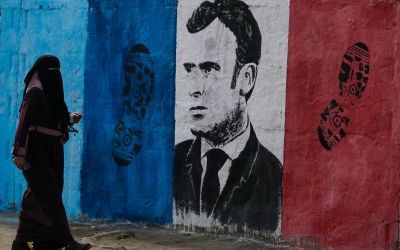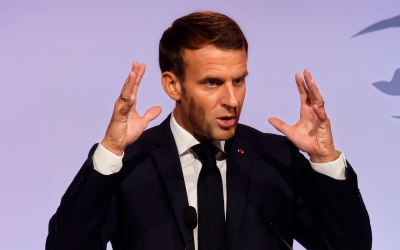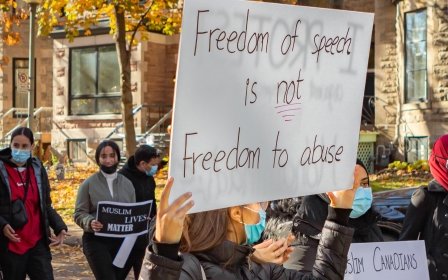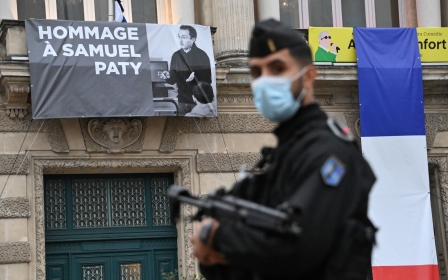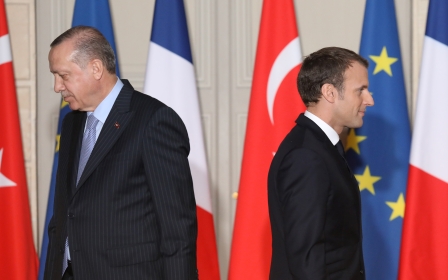French Muslims wary of being dragged into international culture war
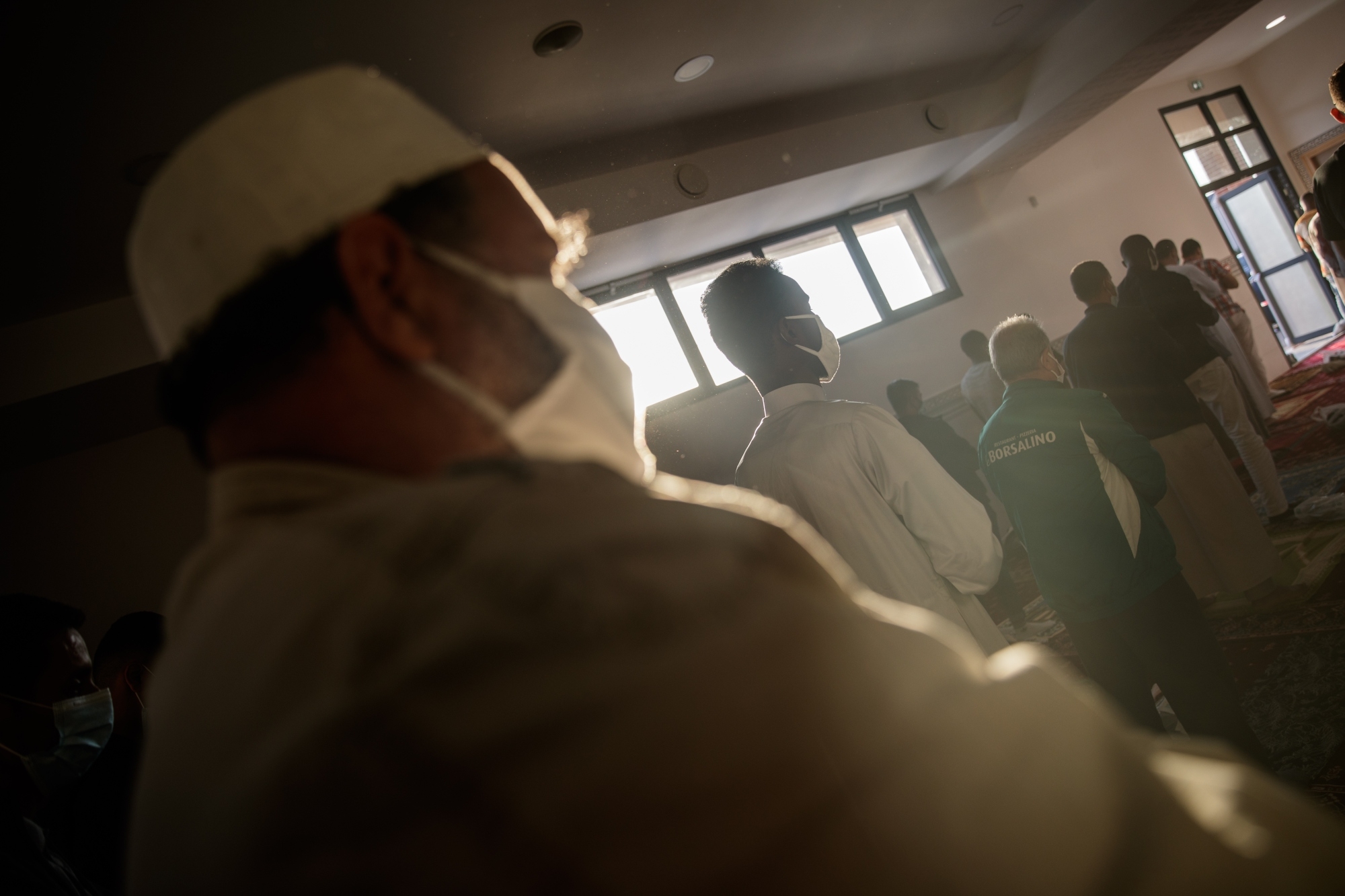
In the past month, there has been no shortage of people with things to say about recent events in France.
Following the murder of French teacher Samuel Paty on 16 October by a lone assaillant after showing a cartoon of Prophet Muhammad in class, French President Emmanuel Macron doubled down on the government’s defence of caricatures of the Muslim prophet - after which his Turkish counterpart, Recep Tayyip Erdogan, called for a boycott of French products as demonstrations erupted across the Muslim world.
New MEE newsletter: Jerusalem Dispatch
Sign up to get the latest insights and analysis on Israel-Palestine, alongside Turkey Unpacked and other MEE newsletters
But amid all the commotion, one community has been little heard from: France’s Muslims.
In Paris, many Muslim approached by Middle East Eye declined to comment on the cartoons controversy and Macron and Erdogan’s reactions.
“We don’t want to comment on this. We have nothing to say,” the owners of an Islamic bookshop in the city’s 11th district said curtly.
Same reaction from Guillaume Sauloup, the head of communication of the Mosque of Paris, who said that his institution had nothing to do with ongoing events in France.
“I do not want to speak on behalf of the Muslim community,” said Abou Bakar, a Parisian who spoke to MEE on the streets of the French capital. “My opinion is personal, as are my spiritual beliefs.”
The wary replies are symptomatic of a general atmosphere of tension and suspicion aimed at the Muslim community in France. In the weeks following Paty’s murder, the French government has vowed to crack down on “separatism” within the nation, pointing at Muslims in France.
For French Muslims who agreed to speak to MEE, the current situation falls in continuity with longstanding tensions over Islam and Islamophobia in France - as some look on with suspicion at the recent foreign outrage over cartoons.
A difficult context
France is believed to be home to the largest Muslim community in Europe, although no official statistics exist in the country on religion and ethnicity. This is the result of a policy of immigration dating back to the late 1940s, when the country engaged in reconstruction efforts after World War II at a time when North Africa was still largely under French colonial rule.
In theory, second- and third-generation immigrants enjoy the same rights as fellow French citizens today - but in practice, discrimination is rife.
“Statistically, if you have North African or sub-Saharan features, you are eight times more likely to be controlled and/or arrested by the police than say, someone of Caucasian type,” explains Olivier Le Cour Grandmaison, a French sociologist specialising in France’s colonial heritage and what he refers to as “state racism”.
“These practices have been denounced by human rights groups, but they continue and are even supported by the state,” the co-author of the book Racisms of France added.
For more than a decade, France’s Muslim community has been at the centre of countless political debates over whether visible expressions of religiosity, such as the hijab, are compatible with newer interpretations of the French conception of secularism, laicite. Critics and rights advocates have warned that legislation and public discourse has led to the stigmatisation of Muslims in the country, while misrepresenting the legal definition of laicite.
Minister of Interior Gerald Darmanin called for the dissolution of several Muslim organisations - including charity BarakaCity and the Collective Against Islamophobia in France (CCIF) - in the wake of the Paty murder, accusing them of bearing some responsibility for “separatism”, as well as being complacent or even supportive of acts of violence in France - allegations the organisations have denied.
While BarakaCity has already been disbanded, the CCIF might meet the same fate. Its defenders see the CCIF as a useful association that documents anti-Muslim acts where the state fails to do so.
“The CCIF is doing a vital fieldwork that allows us to document many cases of violence against Muslims that the state doesn’t see because it only focuses on cases where charges are filed in a police station,” argues Alima Boumediene-Thierry, a human rights lawyer and former member of the European Parliament for France’s Green party. “However, institutions such as the European Court of Human Rights said the CCIF had useful statistics.”
Some French Muslims have tempered the assessment of the situation in France, stating that it could be worse.
'Fascist movements are on the rise in France, there is no doubt about it'
- Ozgur, French activist
“Many Muslims in France and abroad are surprised at the resilience of French society,” says Ozgur, a French leftist activist of Turkish origin. “They have faced brutal terrorist acts in the last five years and yet, there hasn’t been any retaliation in the form of mob lynching like we see elsewhere.”
However, the activist says he fears for the future, as for the first time a right-wing activist was killed by police on 29 October after attempting to stab a French shopowner of North African origin.
“I hope this will not happen again, but fascist movements are on the rise in France, there is no doubt about it. Let’s hope we won’t have a US-like scenario with militias taking to the streets.”
Political calculations
For some, the Elysee’s stance in the wake of the 16 October attack - further compounded by another attack on 29 October in which three people were killed - is political.
“I believe Macron is preparing for the upcoming (2022) elections. He knows his main competitor is going to be Marine Le Pen and that means he needs to push to the far right, that’s all,” says Nabil, a Tunisia-born French citizen working in a Paris restaurant, referring to the leader of the National Rally party against whom Macron won 66 percent of votes in the 2017 presidential runoff vote.
'In my opinion, Erdogan and Macron should be painted with the same brush'
- Hamit, Paris restaurant owner
“France is not more racist than before I think. In the 1960s they used to throw Arabs in the Seine river, you know?” he added, alluding to the brutal crackdown on demonstrators that shook the streets of Paris at the heights of the war for independence in Algeria.
While Macron’s support of the cartoons is perceived by some as political calculation, others who spoke with MEE were equally unimpressed by the Muslim heads of state who were swift to express their outrage over the drawings.
“This controversy is also godsend for Erdogan: it allows this autocratic ruler to create unity among the most conservative parts of the Turkish society, but also all around the Muslim world,” said Ozgur. “It eludes the catastrophic economic situation in Turkey as well as the dwindling popularity the AKP (the ruling party) has faced these last few months.”
Hamit, who owns a Turkish restaurant in the neighbourhood of Menilmontant, agrees.
“In my opinion, Erdogan and Macron should be painted with the same brush,” he says. “I don’t support any politician. I think most people see beyond their speeches and know they are trying to stay in power.”
Middle East Eye delivers independent and unrivalled coverage and analysis of the Middle East, North Africa and beyond. To learn more about republishing this content and the associated fees, please fill out this form. More about MEE can be found here.


